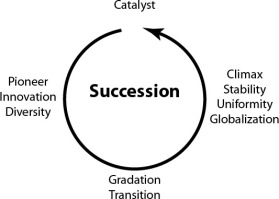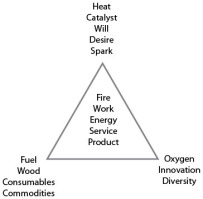Lately I’ve been thinking how complicated our world is, how interrelated everything is, and how each of us has only a tiny understanding of our part in the grand scheme of things. This awareness is not new, of course. Pierre Teilhard de Chardin and others have explored this idea. I was thinking this morning, driving to work, how machines are very much like living organisms. By machines I mean anything with moving parts, from automobiles, to toys, to atomic energy electrical plants. We wouldn’t include things like hand tools, tools like saws, and screwdrivers, and hammers, tools that don’t have moving parts. Some tools do have moving parts, like pliers, but are operated by humans, and are really extensions of ourselves. An electric hedge clipper, though, would be a machine, as it has a motor and has parts that operate, at the command of the operator, but with their own internal operation. In comparing machines with living organisms, what is the difference? Of course, a machine doesn’t have a life of its own – it’s not a living, pulsating organism, able to self-repair and reproduce – and those are significant differences.
The key feature of an organism is life, that is, it has continuous biological processes that require fuel (food) for survival (continuance); it expels waste, and produced some kind of activity (work) that is to its benefit. The key features of machines are that they require an energy source (fuel), have waste products, and perform work. The also have machinery, that is often very complicated, which allows the work to be performed. You might question, “What about machines that don’t have waste products?” It’s true that machines that run on electricity don’t appear to have waste products, but look out the window at the electric plant’s smokestack. That’s where your waste product is.
There is something else that organisms have that machines don’t have, and that’s autonomy, the ability to control, within environmental limitations, their activity. There are organisms that have very limited autonomy, because they’re programmed to perform certain tasks, like worker ants or bees. They can function independently, but within very narrow constraints.
Let’s look at one of our favorite machines. They’re made to look enticing to us homosapiens, but their appearance isn’t really related much to their function. Like the male peacock’s bright feathery and impressive tail, they’re designed to draw humans’ attention – and hopefully their cash. Automobiles are what they are because lots of people came together, with incredibly complex organization and created them. But what do they have and do? They have very complex machinery inside. They utilize fuel to function, fuel that is converted into work of various sorts. They have waste products. They have very complex innards, but they lack life and autonomy. Even the self-driving car of the future will not be autonomous; it will be programmed; it’s activity, though appearing independent will be managed by someone’s control, control from a living organism. Nevertheless, the comparison of my Toyota and other machines with living organisms points out their remarkable similarity.
In looking at organisms and machines, we see that there are lots of similarities, although virtually any organism is incredibly more complex – yes, even more complex than anything humans have yet designed – if you start looking at the molecular level. But there may be levels of human activity where the similarity and differences between human-organized activity and true organisms can get confusing. There’s a level of seemingly organismic activity of humans that is apparent if you move up into the stratosphere and look down. Do you see all those objects moving around. Oh, there’s a hospital. Look. It has electrical lines hooked up to it. It has trucks bringing things to it daily. And, Look! It has garbage trucks leaving daily. People go in and out. They go in in one state and leave in another state. Hmm. Those cars seem like organisms themselves from way up here. If I had only this perspective and were unable to get closer, I’d think that those things that people call cars and trucks are really organisms, and I’d think that that big thing that they call a hospital is just a really big organism.

 would make (or would have made) a satisfactory President? Is this country filled with ignorant people who are unable to discriminate competence? The remaining candidates, thank goodness, all have some credibility, and hopefully some might make adequate Presidents. I have no complaints about people who might be supporting Newt Gingrich, Ron Paul, John Huntsman, or Mitt Romney, though I wouldn’t agree with any of them regarding their choice of candidate.
would make (or would have made) a satisfactory President? Is this country filled with ignorant people who are unable to discriminate competence? The remaining candidates, thank goodness, all have some credibility, and hopefully some might make adequate Presidents. I have no complaints about people who might be supporting Newt Gingrich, Ron Paul, John Huntsman, or Mitt Romney, though I wouldn’t agree with any of them regarding their choice of candidate. but adaptation to a changing world requires openness to that process. And it’s even more important now with the extraordinary effects of the internet and global interconnectedness as well as the increasing rapidity of innovation in technology and its effects throughout the world. Oh – we’re not a Ship of Fools or we would not have survived as well as we have. We do need to assess our foolishnesses from time to time, and this is one of those times.
but adaptation to a changing world requires openness to that process. And it’s even more important now with the extraordinary effects of the internet and global interconnectedness as well as the increasing rapidity of innovation in technology and its effects throughout the world. Oh – we’re not a Ship of Fools or we would not have survived as well as we have. We do need to assess our foolishnesses from time to time, and this is one of those times. it makes us take another look at time. What on earth is it? We know that it’s happening, but what is it really? Like so many things that we take for granted, we have trouble when we try to narrow down and define what time is. Time is just – well – Time! We can measure its passage, can’t we? Of course. With clocks. But what do clocks do? They are a somewhat artificial way of measuring Time! We humans have made up the concepts seconds, minutes, hours….They are not real, but quite arbitrary ways of helping us to organize this thing that we call time. We can also observe change and the sequence of events occurring in the world as some kind of process. And this brings us very close to something important in our definition. That is–experience. Time is something that we experience and that we can observe, and it relates to sequential events and changes. If we didn’t have time, we likely wouldn’t have events or change; but we really don’t know that, because we do have this thing we call time, and we can’t really know what the universe would be like without it–but my opinion is that there would be nothing there!
it makes us take another look at time. What on earth is it? We know that it’s happening, but what is it really? Like so many things that we take for granted, we have trouble when we try to narrow down and define what time is. Time is just – well – Time! We can measure its passage, can’t we? Of course. With clocks. But what do clocks do? They are a somewhat artificial way of measuring Time! We humans have made up the concepts seconds, minutes, hours….They are not real, but quite arbitrary ways of helping us to organize this thing that we call time. We can also observe change and the sequence of events occurring in the world as some kind of process. And this brings us very close to something important in our definition. That is–experience. Time is something that we experience and that we can observe, and it relates to sequential events and changes. If we didn’t have time, we likely wouldn’t have events or change; but we really don’t know that, because we do have this thing we call time, and we can’t really know what the universe would be like without it–but my opinion is that there would be nothing there!




 March 3: The headline on Time’s frontpage today is “Yes, America is in Decline/No America is Still No. 1.” I never hear anyone ask “Why?” so I’m asking it; and suggesting that we’d be a lot better off if we weren’t. It might get us off our grandiose high horse of believing that we are the savior of the world. It’s interesting that we’ve been proved so wrong so many times before, but that doesn’t stop belief. Changing firmly held beliefs may require some kind of full frontal confrontation to get people to wake up. Unfortunately, that kind of confrontation generally brings with it a lot of pain.
March 3: The headline on Time’s frontpage today is “Yes, America is in Decline/No America is Still No. 1.” I never hear anyone ask “Why?” so I’m asking it; and suggesting that we’d be a lot better off if we weren’t. It might get us off our grandiose high horse of believing that we are the savior of the world. It’s interesting that we’ve been proved so wrong so many times before, but that doesn’t stop belief. Changing firmly held beliefs may require some kind of full frontal confrontation to get people to wake up. Unfortunately, that kind of confrontation generally brings with it a lot of pain. The wisdom of the generations is fragile, but that which we preserve and value must be based upon observation and experience, not on myth reflecting out unconscious defensive predilections
The wisdom of the generations is fragile, but that which we preserve and value must be based upon observation and experience, not on myth reflecting out unconscious defensive predilections


 He was referring to infancy; but I think it is also true for children of any age and moreover for our mates and friends, for strangers, and even for our “enemies.”
He was referring to infancy; but I think it is also true for children of any age and moreover for our mates and friends, for strangers, and even for our “enemies.”